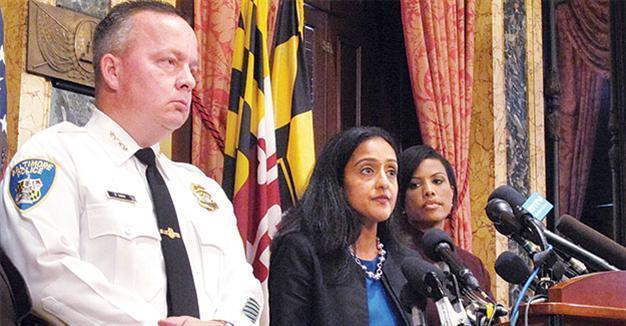Federal report blasts Baltimore police over bias, force
BALTIMORE – The Associated Press

Vanita Gupta, head of the Justice Department's Civil Rights Division, discusses the department's findings on the investigation into the Baltimore City Police Department as Police Commissioner Kevin Davis, left, and Mayor Stephanie Rawlings-Blake, right, listens on Wednesday, Aug. 10, 2016 at City Hall in Baltimore. The Justice Department and Baltimore police agreed to negotiate court-enforceable reforms after a scathing federal report released on Aug. 10 criticized officers for using excessive
The Justice Department and Baltimore Police agreed to negotiate reforms that can be enforced by the courts after a scathing federal report released Aug. 10 criticized officers for using excessive force and routinely discriminating against blacks.The report, the culmination of a yearlong investigation into one of the country’s largest police forces, found that officers make a large number of stops - mostly in poor, black neighborhoods - with dubious justification and unlawfully arrest citizens when officers “did not like what those individuals said.”
“These violations have deeply eroded the relationship between the police and community it serves,” Vanita Gupta, the head of the Justice Department’s civil rights division, said during a news conference alongside the city’s mayor and police commissioner.
The report represents a damning indictment of how the city’s police officers carry out the most fundamental of policing practices, including traffic stops and searches.
Police Commissioner Kevin Davis said officers who committed egregious violations have been fired. He and Mayor Stephanie Rawlings-Blake promised the report would serve as a blueprint for sweeping changes.
The court-enforceable consent decree will force the police agency to commit to improving its procedures to avoid a lawsuit. The decree likely will not be finalized for many months, Gupta said.
The federal investigation was launched after the April 2015 death of Freddie Gray, a 25-year-old black man whose neck was broken while he was handcuffed and shackled but left unrestrained in the back of a police van. The death set off protests and the worst riots in decades.
The Justice Department has undertaken similar wide-reaching investigations into the police in Chicago, Cleveland, Albuquerque and Ferguson, Missouri, among other cities.
The report went far beyond the circumstances of Gray’s death to examine a slew of potentially unconstitutional practices, including excessive force and discriminatory traffic stops.
Federal investigators spent more than a year interviewing Baltimore residents, police officers, prosecutors, public defenders and elected officials, as well as riding along with officers on duty and reviewing documents and complaints.
“Nearly everyone who spoke to us ... agreed the Baltimore Police Department needs sustainable reform,” Gupta said.
Among the findings: Black residents account for roughly 84 percent of stops, though they represent just 63 percent of the city’s population. Likewise, African-Americans make up 95 percent of the 410 people stopped at least 10 times by officers from 2010-15.
During the same time period, officers stopped 34 black residents 20 times, and seven African-Americans 30 times or more. No individuals of any other race were stopped more than 12 times.
One man who spoke to investigators said he was stopped 30 times in less than four years. At least 15 of those stops, he said, were to check for outstanding warrants. None of the stops resulted in charges.
















